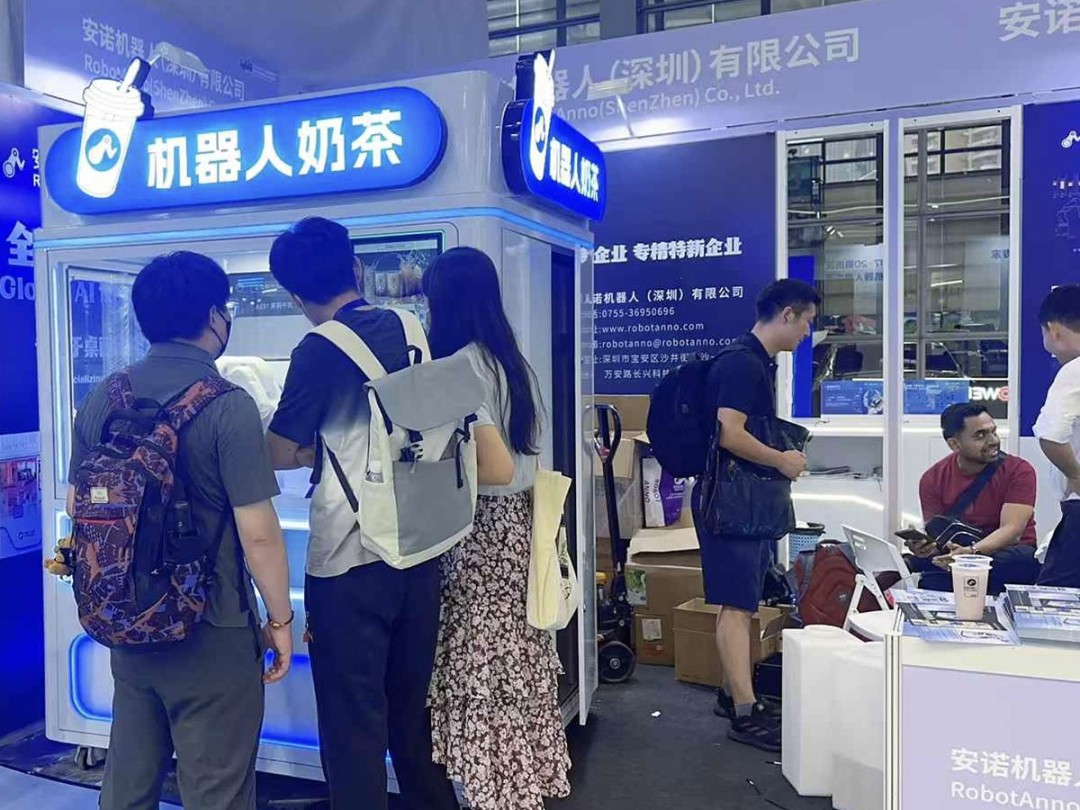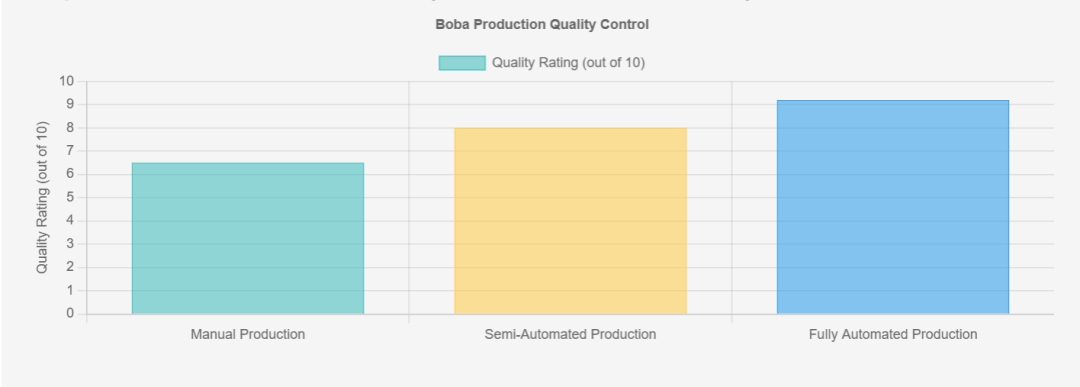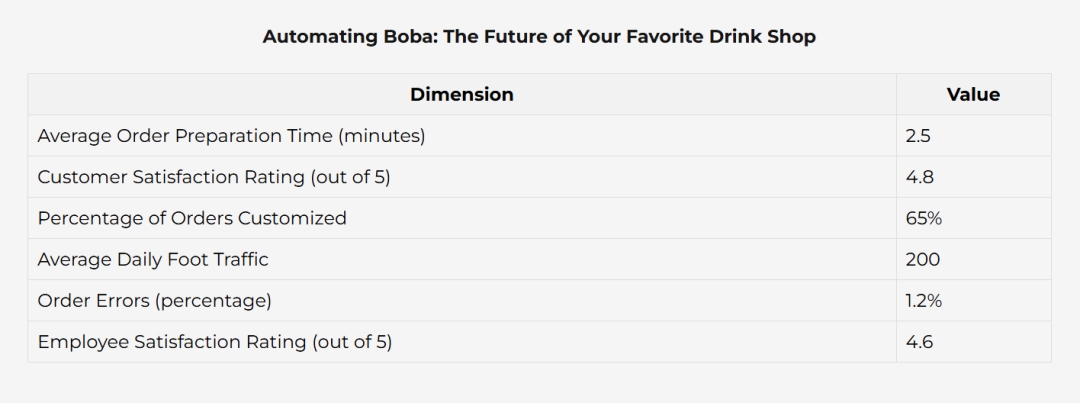As bubble tea continues to captivate global consumers, with an astonishing market growth projected to reach $4.3 billion by 2027, automation is paving the way for a revolution in beverage preparation. The introduction of the "bubble tea robot," designed to streamline the drink-making process, embodies the intersection of technology and tradition in the beverage industry.
Recent industry reports indicate that 60% of bubble tea retailers are looking to implement automation to enhance efficiency and consistency in their offerings. This innovation not only minimizes human error but also caters to the increasing demand for customization as consumers seek personalized drink experiences.
As the manufacturing sector adapts to this growing trend, factories that rank among the top in global exports are commencing the development of sophisticated machines that promise to redefine how we enjoy our favorite bubble tea, ultimately setting new standards in beverage preparation and service.
The Rise of Automation in Beverage Services: Statistics and Trends
The beverage industry is experiencing a significant transformation through automation, driven by the demand for efficiency and consistency in service delivery. According to industry statistics, the food automation market is poised for impressive growth, projected to increase from $6.04 billion in 2023 to $14.4 billion by 2032. This surge highlights a compound annual growth rate of approximately 10.15%, reflecting a growing trend towards the integration of automated solutions in beverage preparation and service.As more beverage establishments seek to enhance operational efficiency, automation technologies are becoming essential. Specifically, automated systems for processing and packaging beverages streamline production and reduce human error, leading to improved product quality and customer satisfaction. Furthermore, the impact of the e-commerce boom coupled with changing consumer expectations necessitates an agile service model, which automation readily provides. With these trends, beverage service automation is not just a passing fad; it represents the future of drink preparation and distribution, ensuring that favorite beverages are delivered with speed and precision, meeting the demands of an increasingly tech-savvy clientele.

Current Challenges Facing Boba Shops in Labor and Supply Chains
As boba shops continue to gain popularity, they are increasingly confronted with challenges in labor and supply chains that threaten their operational efficiency. The labor shortage in the food and beverage industry has hit many boba establishments hard, making it difficult to find skilled workers who can keep up with the high demand for these delicacies. This shortage often leads to longer wait times for customers and burnout for existing staff, ultimately affecting the overall customer experience.Simultaneously, supply chain disruptions have resulted in inconsistent access to critical ingredients, such as tapioca pearls and specialty teas. Fluctuations in import costs and delays in shipping exacerbate the situation, making it challenging for boba shops to maintain their menu offerings. To combat these challenges, many are turning to automation and technology for solutions. By implementing automated systems for both order processing and ingredient management, boba shops can streamline operations, reduce labor dependency, and ensure a consistent supply of products, ultimately securing their foothold in an increasingly competitive market.
Impact of Automation on Quality Control and Consistency in Boba Production
As automation technology advances, its impact on quality control and consistency in boba production is becoming increasingly evident. Traditional methods of crafting boba rely heavily on manual labor and individual expertise, leading to variations in texture, sweetness, and serving temperature. By integrating automated systems, boba shops can achieve a level of uniformity previously unattainable. Automated machines can accurately measure ingredients, ensure precise cooking times, and maintain optimal temperatures, resulting in the perfect boba every time, regardless of who is behind the counter.Moreover, automation not only enhances consistency but also elevates the overall customer experience. With reliable quality control, customers can expect the same delightful taste and texture with every visit, fostering loyalty and repeat business. This shift towards automation allows shop owners to focus more on creativity and innovation, experimenting with new flavors and creative combinations without the fear of compromising quality. As a result, the fusion of technology and boba craftsmanship may very well lead to a bright and exciting future for bubble tea enthusiasts everywhere.
Impact of Automation on Quality Control and Consistency in Boba Production

This chart illustrates the impact of different automation levels on the quality control and consistency in the production of Boba over a period of six months. The data reflects the average ratings obtained through customer feedback and quality assessments.
Future Projections: Market Growth and Technological Advancement in Beverage Automation
As the beverage industry evolves, the automation of drink preparation, particularly in boba shops, is becoming a transformative trend. The global automated materials handling (AMH) equipment market was valued at $35.8 billion in 2019 and is projected to reach $56.5 billion by 2027, growing at a compound annual growth rate (CAGR) of 5.7%. This growth signifies an increasing demand for automation solutions that streamline operations in beverage establishments.Furthermore, the market for packaging machinery, essential for efficient beverage production, is set to expand from $1.13 billion in 2024 to $1.18 billion in 2025, with a robust CAGR of 16.8% projected until 2033. Meanwhile, advancements in optical sensors, which play a crucial role in quality control and process automation, are expected to accelerate market growth, increasing from $208.93 million in 2024 to approximately $607.91 million by 2033. These technological advancements not only enhance productivity but also improve customer experience, solidifying the role of automation in the future of beverage shops, especially in the unique and competitive environment of boba tea.
Customer Experience: How Automation Enhances Service Speed and Satisfaction
The rise of automation in the food and beverage industry is revolutionizing customer experiences, particularly in popular drink shops like boba tea shops. According to a report from the National Restaurant Association, nearly 70% of consumers express that they prefer speed of service over any other factor when choosing a dining option. Automation technologies, such as self-service kiosks and robotic drink mixers, have been shown to reduce wait times significantly, leading to higher customer satisfaction rates. By streamlining the ordering and preparation processes, these innovations not only enhance service speed but also allow staff to focus on customer interaction, creating a more engaging experience.
Moreover, a study by the International Foodservice Manufacturers Association found that implementing automation can lead to a 30% increase in efficiency. Boba shops that adopt these technologies are often better equipped to handle peak hours, ensuring that customers receive their favorite drinks promptly. Customers are increasingly drawn to shops that utilize automation, as they appreciate not only the quick service but also the consistency and quality that automated systems can provide. As boba tea continues to gain popularity, stores that embrace these advancements are likely to thrive in a competitive market driven by consumer demand for speed and quality service.

Media Contact
Company Name: Robot Anno (Shenzhen) Co., Ltd.
Contact Person: Celine
Email: Send Email
Country: China
Website: https://www.annorobots.com/
